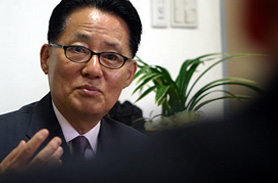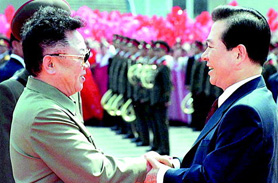 영어토론방 영어토론방 | Home>영어토론방 |
Diplomacy The sham of 'sunshine
페이지 정보

본문
 Formulated by former South Korean president Kim Dae Jung, sunshine policy has guided the South's relations with the North for the last eight years. The name of the policy comes from an Aesop fable in which the wind and the sun compete to remove a man's coat. The wind blows and blows, only forcing him to clutch the coat around himself more tightly. But when the sun shines down, he freely takes it off.
Formulated by former South Korean president Kim Dae Jung, sunshine policy has guided the South's relations with the North for the last eight years. The name of the policy comes from an Aesop fable in which the wind and the sun compete to remove a man's coat. The wind blows and blows, only forcing him to clutch the coat around himself more tightly. But when the sun shines down, he freely takes it off. This makes for a rather cute bedtime story, but it hasn't worked out so well as a foreign policy. The hope of sunshine was that the South, by engaging North Korea diplomatically and economically, could soften Pyongyang's attitudes and promote eventual reconciliation and reunification. But Kim hasn't exactly returned the love.
"If sunshine were about instigating capitalism and freedom [in North Korea], we could support it," says a former senior official in the Bush administration. "The problem is that it has become a sop to the North Korean system, not an attempt to bring about its transformation." A current senior administration official is more diplomatic: "The United States is not opposed to inter-Korean cooperation… But what we're especially supportive of is those forms of cooperation that promote measurable reforms in the North." As far as "eliciting a change in behavior" goes, the official says, "I don't think it's been very successful."
No, it hasn't. In the past eight years, Kim has only grown more bellicose. He has dashed forward with his nuclear program. He has built new missiles and tested them despite promises not to. And he has become the world's chief arms supplier to rogue regimes, including that of Iran's mullahs. Any illusion that Seoul's goodwill had won it an iota of influence over the North was shattered with the latest batch of missile tests, which South Korea practically begged Kim not to conduct.
Perhaps the only tangible benefit South Korea has gotten from the sunshine policy is cheap labor in the North Korean city of Kaesong, where South Korean companies have been allowed to build manufacturing plants. These few ventures have hardly shaken the foundations of North Korea's Stalinist economy. "If they wanted to spread capitalism," says the former administration official.
Apart from Kaesong, the sunshine policy has amounted to nothing but empty gestures: occasional reunions of separated families and meetings between officials of the North and the South. The most famous such meeting was the 2000 "peace summit" between Kim Jong Il and Kim Dae Jung, an event that North Korea agreed to only after the South forked over $186 million in cash on top of the hundreds of
millions in fertilizer and food aid it was already giving. In return, the North has repeatedly embarrassed the South: by storming out of high-level meetings, by canceling at the last minute the opening of a rail link between the two countries, by pulling back from the very limited economic reforms it launched in 2002, by killing four South Korean sailors in a dispute over fishing rights, and by generally being a menace.
Obama’s North Korea policy likely to alter security framework of Northeast Asia
Leon Sigal, the director of the Northeast Asia Cooperative Security Project at the Social Science Research Council, echoed the view that Obama would take an “active and comprehensive approach” to North Korea. Sigal said the incoming Obama administration needs to present gradual and comprehensive measures in a give-and-take relationship with the North. In exchange, North Korea should fall into step with the United States by removing its nuclear weapons program, Sigal said.
 The North Korean nuclear issue could become the first test for Obama’s pursuit of a nuclear-free world because Pyongyang has already agreed on the denuclearization on the Korean Peninsula under the September 19 Joint Statement, Suh said. Supporting this theory is the fact that influential figures in U.S. diplomacy and security policy such as former Secretary of Defense William Perry, former Senator Sam Nunn and former Secretaries of State George Schultz and Henry Kissinger have already renewed their calls for a “nuclear-free world,” according to Suh.
The North Korean nuclear issue could become the first test for Obama’s pursuit of a nuclear-free world because Pyongyang has already agreed on the denuclearization on the Korean Peninsula under the September 19 Joint Statement, Suh said. Supporting this theory is the fact that influential figures in U.S. diplomacy and security policy such as former Secretary of Defense William Perry, former Senator Sam Nunn and former Secretaries of State George Schultz and Henry Kissinger have already renewed their calls for a “nuclear-free world,” according to Suh. With inter-Korean relations deteriorating as a rapid current of change is foreseen, voices demanding changes in the Lee Myung-bak administration’s policy toward North Korea have emerged.
Leon Sigal warned that if the South Korean government does not resume food support and pursue negotiations with the North, there is a great danger it will lag behind while U.S.-North Korea relations improve at a rapid rate. In response to President Lee’s recent comment that “even if tensions between South and North Korea escalate, it will have no negative effects on the South Korean economy” in particular, Sigal said it was a statement “ignoring the reality of how sensitive investors have been since the financial crisis began.” He commented that a process of deepening political and economic relations between North Korea and nations such as the United States, South Korea and Japan could spur North Korea to make a decision to abandon its nuclear weapons program.
댓글목록
등록된 댓글이 없습니다.

